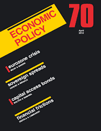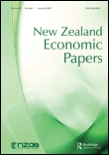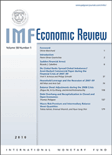
Journal of Global Economic Analysis
Scope & Guideline
Exploring the intersection of mathematics, economics, and statistics.
Introduction
Aims and Scopes
- Computable General Equilibrium (CGE) Modeling:
The journal primarily emphasizes the development and application of CGE models, which are vital for analyzing economic phenomena in a structured manner, allowing for the evaluation of policy impacts, trade dynamics, and sectoral interactions. - Data Integration and Methodological Innovations:
Contributions often focus on the integration of various datasets, such as the GTAP (Global Trade Analysis Project) database, and the development of new methodologies that improve the accuracy and applicability of economic models. - Sectoral and Regional Economic Analysis:
The journal covers a wide range of topics related to sectoral analyses, including agriculture, industry, and services, and often examines regional economic interactions, making it relevant for both global and local economic assessments. - Policy Implications of Economic Models:
Research published in the journal aims to provide insights into the policy implications of economic modeling, addressing issues such as trade policy, environmental sustainability, and economic development. - Interdisciplinary Approaches to Economic Analysis:
The journal encourages interdisciplinary research that incorporates insights from economics, environmental science, and social sciences, enhancing the robustness of economic analyses.
Trending and Emerging
- Circular Economy and Environmental Sustainability:
The introduction of topics related to circular economy frameworks, such as municipal solid waste streams, indicates a growing emphasis on sustainability and environmental impacts within economic analysis. - Innovative Teaching Tools for Economic Modeling:
Research focusing on innovative educational tools, such as the SMART Handout for teaching CGE modeling, reflects an emerging interest in enhancing the instructional aspects of economic analysis. - Endogenous Variables in CGE Models:
The incorporation of endogenous markups and capital utilization within CGE frameworks suggests a trend towards more complex and realistic modeling that accounts for variable interactions in economic systems. - Integration of Nutrition and Health into Economic Models:
The increasing focus on incorporating nutritional accounts into economic models highlights a trend towards understanding the intersection of health, nutrition, and economic outcomes, reflecting broader social concerns. - Technological Integration in Economic Analysis:
The use of advanced computational tools, such as GEMPACK simulations in R, demonstrates a trend towards leveraging technology to enhance the analysis and dissemination of economic research.
Declining or Waning
- Traditional Trade Models:
There has been a noticeable decrease in publications centered on traditional trade models without incorporating new data or methodologies. The shift towards more dynamic and integrated models suggests a waning interest in conventional approaches. - Basic Non-Tariff Measures Analysis:
While non-tariff measures (NTMs) remain an important topic, the depth of analysis appears to be shifting towards more sophisticated methodologies rather than basic assessments, leading to fewer papers focused solely on NTMs. - Static Economic Analysis:
Research focusing on static economic analysis has declined, with a growing preference for dynamic models that can capture changes over time and their implications for global economic trends. - Generalized Mathematical Derivations:
The emphasis on purely mathematical derivations of economic models has waned, as researchers increasingly seek applied studies that demonstrate the practical implications of their theoretical work.
Similar Journals

ECONOMIC POLICY
Exploring the Frontiers of Economic ThoughtECONOMIC POLICY is a leading academic journal published by Oxford University Press, focusing on a broad spectrum of topics within the field of economics and related disciplines. With its ISSN 0266-4658 and E-ISSN 1468-0327, the journal serves as a vital platform for disseminating cutting-edge research and innovative policy analysis critical to both scholars and practitioners. As a testament to its quality and significance, ECONOMIC POLICY is classified in the Q1 quartile for both Economics and Econometrics and Management, Monitoring, Policy, and Law, and boasts impressive rankings within Scopus—placing it in the top 25% of its respective fields. Operating from the esteemed Oxford campus in the United Kingdom, the journal has produced a wealth of knowledge since its inception in 1988, with plans to continue shaping economic discourse through 2024 and beyond. While the journal does not offer Open Access options, it remains a cornerstone for anyone dedicated to understanding the complexities of economic policy and its impact on global society.

New Zealand Economic Papers
Fostering critical dialogue on New Zealand's economic landscape.New Zealand Economic Papers is a prominent academic journal dedicated to the field of economics, published by Taylor & Francis Ltd. With its ISSN 0077-9954 and E-ISSN 1943-4863, this journal has been a significant contributor to economic discourse since its inception in 1966, continuing to provide valuable insights through to 2024. As part of the third quartile (Q3) in the Economics, Econometrics and Finance category, it ranks at #165 out of 288 in Scopus, placing it within the 42nd percentile, demonstrating its respectable impact in the academic community. Although the journal does not offer open access, it remains a vital resource for researchers, professionals, and students interested in understanding economic dynamics, policy analysis, and applied econometrics, particularly in the context of New Zealand. The journal's commitment to rigorous research ensures that it continues to play a crucial role in shaping economic policy and academic thought across the globe.

IMF Economic Review
Exploring Innovative Analyses in Economics and BusinessIMF Economic Review, published by Palgrave Macmillan Ltd, stands as a preeminent journal in the fields of Economics and Business Management, holding a prestigious Q1 ranking in both categories as of 2023. With an ISSN of 2041-4161 and an E-ISSN of 2041-417X, this journal not only showcases high-quality, peer-reviewed research but also embraces the principles of Open Access, promoting wide dissemination of its findings to researchers, professionals, and students alike. Spanning significant years from 2010 to 2024, the IMF Economic Review features innovative analyses and insights that challenge conventional economic paradigms and foster deeper understanding of global economic dynamics. Its impressive Scopus ranking places it in the top 10% of economics journals globally, affirming its vital role in advancing academic discourse and practical application in economics and finance. For those dedicated to exploring the intricacies of economic theory and practice, the IMF Economic Review is an invaluable resource that not only informs but also inspires.

China Economic Quarterly International
Advancing Knowledge on China's Evolving Socio-Economic FrameworkWelcome to China Economic Quarterly International, a leading peer-reviewed journal published by KEAI PUBLISHING LTD, dedicated to advancing the study of economic, sociological, and geographical issues pertinent to China and beyond. Since its transition to Open Access in 2021, the journal has significantly increased its accessibility, encouraging wider dissemination and engagement within the academic community. With impressive rankings in the 2023 Scopus Categories, including a prestigious Q1 designation in multiple fields such as Economics, Sociology, and Geography, the journal provides a comprehensive platform for innovative research and interdisciplinary dialogue. Its timely issues cover contemporary challenges and developmental trends, making it invaluable for researchers, professionals, and students who seek to deepen their understanding of the dynamic economic landscape. As the journal continuously aims to foster academic collaboration and stimulate critical discussions, it stands out as a pivotal resource for insights into China's evolving socio-economic framework.

INTERNATIONAL ECONOMICS AND ECONOMIC POLICY
Connecting Theory and Practice in International EconomicsINTERNATIONAL ECONOMICS AND ECONOMIC POLICY, published by Springer Heidelberg, is a pivotal journal in the field of economics, focusing on both theoretical and empirical research that addresses pressing international economic issues. With an ISSN of 1612-4804 and an E-ISSN of 1612-4812, this journal has been a reliable source of insights since its inception and is poised for continuous growth, converging its themes from 2005 to 2024. Ranked in the Q2 category of Economics and Econometrics in 2023, it stands at a commendable 63rd percentile among similar journals, emphasizing its significance and impact in the academic community. Located in Heidelberg, Germany, the journal provides an access portal for researchers, professionals, and students to engage with cutting-edge economic analyses that inform policy and practice globally. By publishing original articles, reviews, and policy discussions, INTERNATIONAL ECONOMICS AND ECONOMIC POLICY plays a crucial role in shaping the discourse within the global economics landscape.

International Advances in Economic Research
Connecting Theory and Practice in the Economics LandscapeInternational Advances in Economic Research, published by SPRINGER, stands as a significant resource within the field of economics and econometrics, consistently contributing to the theoretical and empirical understanding of economic phenomena since its inception in 1995. With an ISSN of 1083-0898 and E-ISSN of 1573-966X, this journal is dedicated to advancing economic research through a rigorous peer-review process and disseminating high-quality scholarly articles. The journal's esteemed classification places it in the third quartile (Q3) within the Economics and Econometrics category for 2023, indicating its respectable standing in academic circles. It serves as an important conduit for the dissemination of innovative economic theories, data analysis, and policy discussions, appealing to researchers, professionals, and students alike. Though not an open-access journal, it provides valuable subscription-based content that enriches the understanding of diverse economic issues and fosters a community of inquiry among academics. With its projected outlook extending to 2024, International Advances in Economic Research continues to be an essential platform for scholars aiming to influence and engage with contemporary economic debates.

Statistika-Statistics and Economy Journal
Navigating the Intersection of Data and Economics.Statistika-Statistics and Economy Journal, published by the Cesky Statistical Office in the Czech Republic, serves as a vital platform for dissemination and discussion of research in the fields of statistics, economics, and econometrics. With an ISSN of 0322-788X and E-ISSN 1804-8765, this Open Access journal has been committed to promoting free access to scholarly work since 2011, allowing researchers, professionals, and students to engage with valuable content. As of 2023, it holds a Q4 ranking in both the Economics and Econometrics and Statistics, Probability and Uncertainty categories, reflecting its emerging presence within these disciplines. The Converged Years from 2015 to 2024 emphasize the journal’s ongoing contribution to the academic community, while its rankings in Scopus highlight its position among peers. The journal aims not only to foster rigorous academic discourse but also to provide practical insights into the application of statistical methods in economic contexts, ensuring its relevance amidst the evolving challenges of data analysis and economic theory. Its location in Prague positions it at the crossroads of European scholarship, making it a noteworthy resource for those dedicated to advancing the field of statistics and economy.

Eurasian Economic Review
Exploring the dynamics of Eurasian economies.Eurasian Economic Review is a premier academic journal dedicated to the dissemination of high-quality research in the field of economics, notably within the Eurasian context. Published by SPRINGER HEIDELBERG in Switzerland, this journal stands out with an impressive Q2 ranking in the 2023 category of Economics, Econometrics and Finance, reflecting its influential role in fostering scholarly dialogue. The journal encompasses a broad array of topics related to economic trends, policy impacts, and theoretical advancements, making it an essential resource for researchers, professionals, and students alike. With a consistent output since its inception in 2011, the Eurasian Economic Review is committed to providing open access to its valuable content, ensuring that important findings are widely available to the global research community. As a member of the top 9th percentile in Scopus rankings for its field, this journal uniquely positions itself as a vital conduit for innovative and impactful research in economics.

Journal of Economic Integration
Navigating the Complexities of Economic Integration.The Journal of Economic Integration, published by Sejong University Center for International Economics, stands as a pivotal forum for scholarly discourse in the field of economics, particularly focusing on the interwoven dimensions of economic systems and integration processes. With an ISSN of 1225-651X and an E-ISSN of 1976-5525, this journal plays a crucial role in disseminating high-quality research that navigates both theoretical frameworks and empirical studies, appealing to researchers and practitioners alike. Regarded as a Q2 journal in the Economics, Econometrics and Finance category for 2023, it ranks 100th out of 288 in Scopus, reflecting its significant competitive standing in the field. The journal encourages contributions that explore the implications of economic policies and integration on global and regional scales, fostering a deeper understanding of challenges and opportunities arising from economic collaboration. Published biannually from 2013 to 2024, it aims to bridge gaps in knowledge while promoting critical analysis and discussions among academics, policymakers, and students. This makes the Journal of Economic Integration an indispensable resource for anyone engaged in the dynamic field of economics.

OPEN ECONOMIES REVIEW
Bridging Theory and Practice in Economics.OPEN ECONOMIES REVIEW is a distinguished journal, published by SPRINGER in the field of economics and econometrics, dedicated to exploring the complexities of global economic interactions and policy implications. With its ISSN 0923-7992 and E-ISSN 1573-708X, this journal serves as a vital platform for scholars and practitioners alike, offering insights that bridge theoretical and empirical research. Established in 1990, it is set to continue its impactful journey through 2024, showcasing research that is ranked in the top quartile (Q2) of its category for 2023 and positioned in the 46th percentile overall among economic journals. Although not an open-access journal, it ensures comprehensive accessibility to cutting-edge findings and methodologies in economics, contributing to informed decision-making and policy development. Situated in the Netherlands at VAN GODEWIJCKSTRAAT 30, 3311 GZ DORDRECHT, this publication is essential for researchers, professionals, and students seeking to navigate the dynamic landscape of global economies.